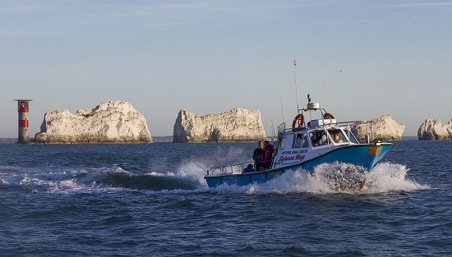
Sea Angling Safety Guidelines
Every year the media reports the tragic news of anglers who have lost their lives while fishing. As the national representative body for angling the angling trust provides advice on how to stay safe while sea fishing so that accidents and fatalities are minimised. Following this advice will help you, your friends and your family, stay safe when fishing on the coast or at sea.
Be Safe Afloat
Have on board a boat:
- Lifejackets for everyone.
- Spare fuel.
- Two anchors.
- Ample rope.
- Oars or spare engine.
- Compass.
- First Aid Box.
- VHF Radio.
- Lights.
Before Sailing:
- Check weather and tides.
- Wear suitable clothing.
- Tell someone your expected return time.
- Do not overcrowd your boat.
- Do not take chances.
Be Safe On The Shore
At Night:
- Do not fish alone in remote spots.
- Take more than one light.
When Rock Fishing:
- Wear sensible footwear.
- Take a rope.
- Tell someone where you will be and your expected return time.
- Be aware of rising tides, don’t be cut off.
- Take care when casting.
- Always carry a First Aid Kit.
Small Boat Safety Advice
- While fishing be on your guard at all times against capsizing the boat. Standing up when the boat is moving is dangerous.
- Keep fish slime and bait from fouling the deck or bottom boards. Spare rods and gaffs etc. left lying around can make you lose your footing.
- Make a habit of keeping a good look out for vessels as angling boats not displaying adequate anchor signals will be indicating to ships and other vessels that the boat is under way and be able to keep clear as required by the International Collision Regulations. Be Warned.
- Keep your anchor cable buoyed and ready to slip it in an emergency.
- Keep a lookout for the onset of sea mist and for signs of bad weather coming up. The situation can change in a few minutes.
- Have a radio and listen regularly to the weather forecast especially if you are a long way out.
- Do not forget your compass and flares.
An angler needs to have just as much knowledge and skill in handling his boat as any other boat user and has to know how to catch fish as well. But fishing from a small boat has its own special hazards, and at sea you should not be so interested in the fishing that you forget all else. The boat is not merely a means of putting you over a good fishing mark, you are trusting your life to it: make sure it is adequate for the purpose. To make a good fishing platform the boat should be broad-bottomed, the beam of width about a third the length, so that you do not have to be over-anxious about your movements in her. You need space as well and this should be allowed for in the loading. Two people ought to have a boat of about 12ft to 14ft overall length and each extra person should have about another 2ft of length above that. Boats under 12ft in length are not really suitable for angling at sea.
Inflatable boats are not a good choice either because their lack of draught lets them be buffeted about at anchor, and also because of the risk of damage from sharp pointed gaffs and large hooks.
The boat should have a strong bow ring for towing and anchoring. Grab lines, fitted around the boat for anyone going overboard.
Carry a spare anchor, chain and warp of good length. Have clothing with you suited to whatever weather may turn up, but thigh length waders are not likely to be of much benefit and could prove disastrous if you fall overboard.
Launching and landing is usually on the beach. Learn to do this properly in calm conditions and then, with more experience, in a moderate surf. Before proceeding to sea tell someone ashore of your intentions and estimated time of return.
When choosing your fishing ground keep within a distance of base or shelter which you can make in good time when weather worsens according to the sort of vessels you have. It is safer to fish in company with others. Anchoring in or close to shipping lanes or buoyed fairways risks being run down and is a nuisance to other shipping.
It is often risky for small craft to round headlands, especially those with no safe haven beyond.
You will usually be anchoring in a current and at greater depths than most small boats. You must learn how to do this properly.
Anglers, like everyone else, should observe the Rules of the Road, but in addition they have to show proper signals of shapes when at anchor or fishing.
IN AN EMERGENCY DIAL 999 AND ASK FOR THE COASTGUARD








